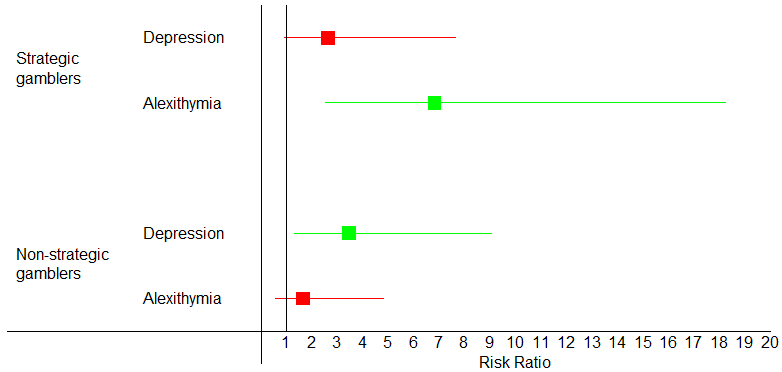The WAGER, Vol. 22(8) – Game selection: Alexithymia and depression in strategic and non-strategic gamblers
Some people separate gamblers into strategic gamblers and non-strategic gamblers. Strategic gamblers prefer games where analysis and skill matter, such as poker, sports betting, and political markets. Non-strategic gamblers prefer games where strategy plays little to no role, such as scratch tickets, lotteries, and slot machines. In a recent study, Céline Bonnaire and her colleagues speculated that these preferences could create different pathways to gambling problems. Those with difficulty regulating their emotions might excessively play strategic games in order to seek excitement; on the other hand, those with depression might play non-strategic games excessively in order to avoid negative emotions. This week, The WAGER reviews their study.
What was the research question?
Is it the case that among people who prefer strategic games, is difficulty regulating emotions—and not depression—will be linked to pathological gambling? Among people who prefer non-strategic games, will depression—and not difficulty regulating emotions—be linked to pathological gambling?
What did the researchers do?
Bonnaire and her colleagues recruited gamblers from cafes, racetracks, and a casino near Paris. Participants provided demographic information and described their gambling. They also completed screeners for pathological gambling, alexithymia (i.e., difficulty identifying and describing feelings), and depression. Based on their responses, the researchers separated the participants into strategic gamblers (n = 92; e.g., those who bet on sports and card games) and non-strategic gamblers (n = 97; e.g., those who played lotteries, scratch cards, and roulette). The researchers also classified the participants according to whether they met criteria for pathological gambling (PG). They used separate logistic regressions for strategic and non-strategic gamblers to observe any associations between PG status and levels of alexithymia and depression.
What did they find?
Among strategic gamblers, those with higher alexithymia scores were more likely to meet criteria for pathological gambling, but there was no statistically significant relationship between depression and pathological gambling. Among non-strategic gamblers, the opposite was true: participants with higher depression scores were more likely to meet criteria for pathological gambling, but there was no statistically significant relationship between alexithymia and pathological gambling.

Figure. Relationships between depression/alexithymia and pathological gambling, separately for strategic and non-strategic gamblers. The boxes represent risk ratios and the lines indicate confidence intervals. Adapted from Bonnaire et al. (2017). Click image to enlarge.
Why do these findings matter?
Gambling preferences are sometimes tied to co-occurring mental health issues. Those experiencing depression, for example, might be searching for distractions or activities that don’t require as much thinking, such as scratch tickets and slot machine play. Those experiencing alexithymia might be looking for exciting circumstances, such as the watching a sporting event with money at risk based on the outcome, or the elation of winning after outthinking or trapping an opponent in a card game. Gamblers with these or other mental health issues might be more inclined to use gambling to cope with their pain, and thus be more susceptible to gambling problems. By considering their clients’ other mental health issues and reasons for gambling, clinicians can tailor treatment to address their underlying motivations and needs. Asking gamblers about the games they play—and why they play them—can help establish rapport while also extracting information that will be useful to the clinician going forward.
Every study has limitations. What are the limitations in this study?
The sample sizes were relatively small (under 100 in each group), and there were very few female participants. A larger study with more participants might find different patterns and trends either in general or for more men and women separately.
For more information:
Your First Step to Change has toolkits that people can use to evaluate their own addiction-related behavior and develop strategies for change. The toolkit for gambling is available in six languages, including Spanish and Chinese.
— Matthew Tom
What do you think? Please use the comment link below to provide feedback on this article.